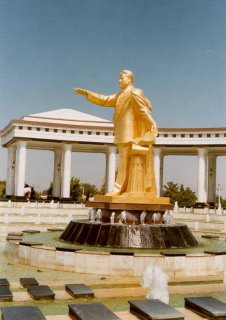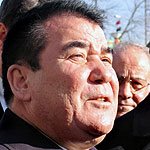 Recently, reader Eriqua left a comment, asking:
Recently, reader Eriqua left a comment, asking:"do we have any modern examples of women dictators? I just wonder if the gender gap has been bridged"
This is a fairly good question. The answer is, somewhat surprisingly, not really. Even though it's a man's world, there have certainly been some notable female tyrants, but nearly all of them have been monarchs from centuries past. From Queen Ravanalona I ("The Cruel") of Madagascar to Empress Catherine II of Russia, one would normally find a crown on the head of a woman crushing her people under her heel.
Given the relatively small list of female national leaders, the question remains: where are the dictators? It is curious that for communism's alleged penchant for gender equity, not one of the leaders of the former Soviet Union, nor any of its satellite states, was a woman. Similarly, there were no women among the military brasshats taking power in South America or post-colonial Africa. Lots of superfluous military decorations, yards of shiny patent leather, but no estrogen. Even when Pakistan's Benazir Bhutto took the top job in a nation notorious for its dictatorships, she either failed, or elected not to, follow in the footsteps of some of her infamous contemporaries.
So where has the modern age, so rife with dictators, found a woman's touch? Naturally, there have been a number of dictators whose wives have played a role behind the scenes, but only one of them, Argentina's Eva Perón, took a public role alongside her dictator husband (a role she eventually renounced). One supposes there are other reasons for a lack of women dictators, ranging from the traditional links between military service and dictatorial rule, to the overall lack of women in prominent leadership roles around the world, but even considering the diminished opportunities, few female rulers have sought to rule with an iron fist as male rulers have.
The best I can think of is a woman who, while not a dictator in the strict sense of the word, did at one point exercise dictatorial control over her country: the late Indira Gandhi of India (pictured above, manhandling a hapless koala).
Riding high after crushing Pakistan in the 1971 war of Bangladeshi Independence and India's equally successful entry to the nuclear age, Gandhi was riding high until the country found itself paralyzed by a political crisis in 1975. Without hesitating, Gandhi suspended India's democracy during the (now infamous) "emergency period", during which time, she adopted dictatorial powers, including the all important ability to rule by decree.
During the two year emergency period, Gandhi rode roughshod over her political enemies, sending tens of thousands of political opponents to jail on specious charges, imposed strict press censorship, dismissing state officials perceived to be hostile to her rule, while simultaneously grooming her sons Sanjay and Rajiv for a more political role.
Gandhi's confidence proved to be her undoing. Believing the economic progress made during the emergency period added to her political prestige, she called for new elections in 1977, and was soundly trounced by the opposing BJP party. She removed herself from office without a struggle, thus ending the brief and only dictatorship by a woman in the last century. Indira returned to power again, with disastrous results, before being assassinated by her Sikh bodyguards in 1984.


